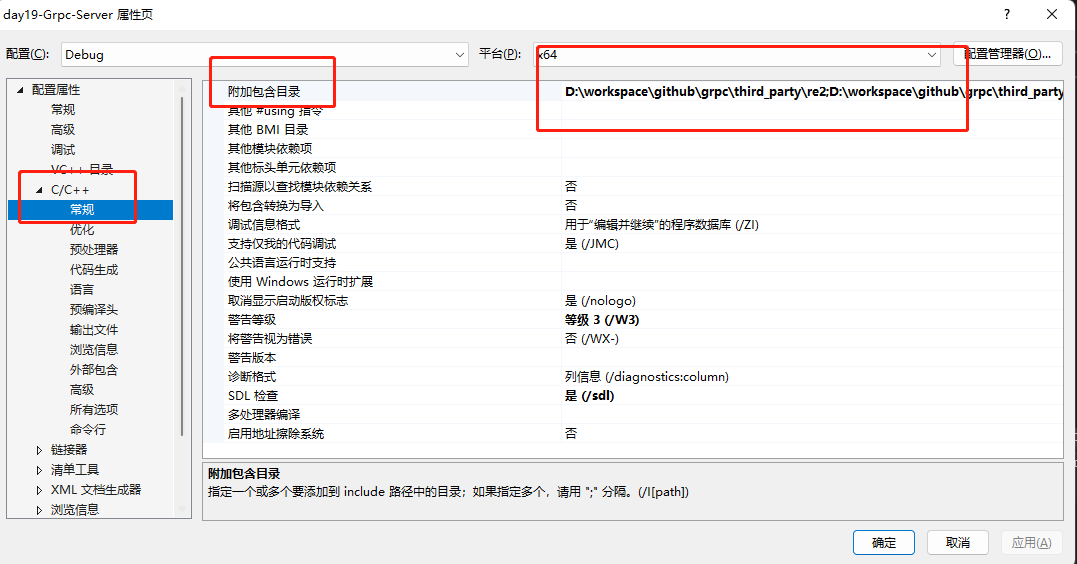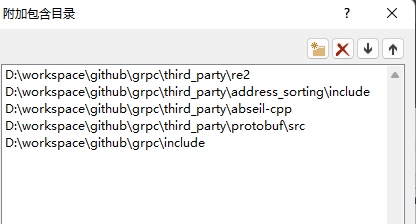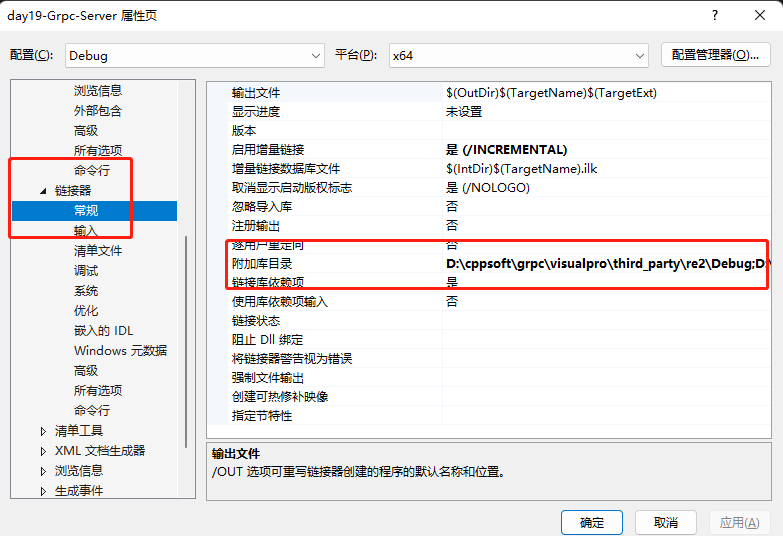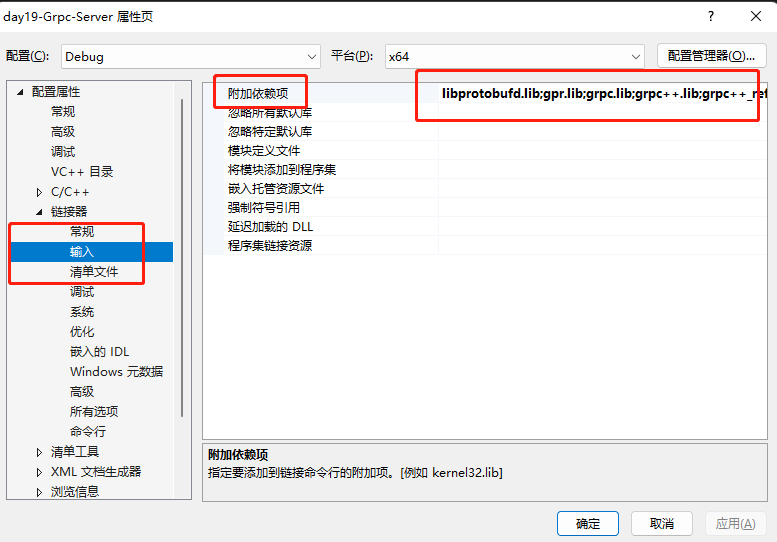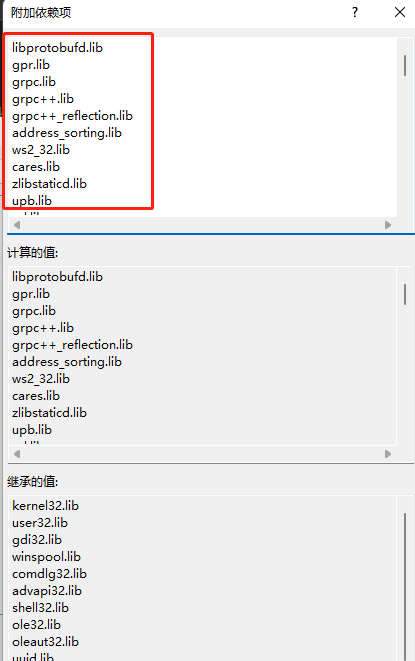简介
本文主要讲述如何在Windows环境下使用visual studio配置grpc,并且实现grpc通信的例子。前文windows配置和编译grpc已经介绍了如何在windows环境配置grpc,接下来我们利用之前编译好的库配置到项目中,并实现grpc通信。
项目配置
我们为了方便配置,将之前下载和编译好的项目放在D盘cppsoft文件夹下,路径为D:\cppsoft\grpc。
接下来我们创建一个项目,名字叫Grpc-Server,在项目的根目录下创建一个proto名字为demo.proto
syntax = "proto3";
package hello;
service Greeter {
rpc SayHello (HelloRequest) returns (HelloReply) {}
}
message HelloRequest {
string message = 1;
}
message HelloReply {
string message = 1;
}
接下来我们利用grpc编译后生成的proc.exe生成proto的头文件和源文件
D:\cppsoft\grpc\visualpro\third_party\protobuf\Debug\protoc.exe -I="." --grpc_out="." --plugin=protoc-gen-grpc="D:\cppsoft\grpc\visualpro\Debug\grpc_cpp_plugin.exe" "demo.proto"
上述命令会生成demo.grpc.pb.h和demo.grpc.pb.cc文件。
D:\cppsoft\grpc\visualpro\third_party\protobuf\Debug\protoc.exe表示protoc.exe所在的路径,你可以将其放在指定目录并配置环境变量,直接使用protoc.exe就行了。
-I="." 指定 demo.proto所在的路径为当前路径。
--grpc_out="." 表示生成的pb.h和pb.cc文件的输出目录。
--plugin=protoc-gen-grpc="D:\cppsoft\grpc\visualpro\Debug\grpc_cpp_plugin.exe"表示要使用的插件为cpp插件,也就是生成cpp类的头文件和源文件。
接下来我们生成grpc类需要的pb文件,因为要序列化数据。
D:\cppsoft\grpc\visualpro\third_party\protobuf\Debug\protoc.exe --cpp_out=. "demo.proto"
上述命令会生成demo.pb.h和demo.pb.cc文件。
接下来我们在项目中配置grpc库的包含目录和库目录。 为了方便调试,我们配置debug版本
项目属性中选择C++下的常规选项,在附加包含目录中添加我们grpc生成debug库
这里列举下要包含的目录
D:\workspace\github\grpc\third_party\re2
D:\workspace\github\grpc\third_party\address_sorting\include
D:\workspace\github\grpc\third_party\abseil-cpp
D:\workspace\github\grpc\third_party\protobuf\src
D:\workspace\github\grpc\include
接下来配置库路径, 在链接器常规选项下,点击附加库目录,添加我们需要的库目录。
同样,我们配置的是debug版本
要配置的库目录很多,这里详细列举一下
D:\cppsoft\grpc\visualpro\third_party\re2\Debug
D:\cppsoft\grpc\visualpro\third_party\abseil-cpp\absl\types\Debug
D:\cppsoft\grpc\visualpro\third_party\abseil-cpp\absl\synchronization\Debug
D:\cppsoft\grpc\visualpro\third_party\abseil-cpp\absl\status\Debug
D:\cppsoft\grpc\visualpro\third_party\abseil-cpp\absl\random\Debug
D:\cppsoft\grpc\visualpro\third_party\abseil-cpp\absl\flags\Debug
D:\cppsoft\grpc\visualpro\third_party\abseil-cpp\absl\debugging\Debug
D:\cppsoft\grpc\visualpro\third_party\abseil-cpp\absl\container\Debug
D:\cppsoft\grpc\visualpro\third_party\abseil-cpp\absl\hash\Debug
D:\cppsoft\grpc\visualpro\third_party\boringssl-with-bazel\Debug
D:\cppsoft\grpc\visualpro\third_party\abseil-cpp\absl\numeric\Debug
D:\cppsoft\grpc\visualpro\third_party\abseil-cpp\absl\time\Debug
D:\cppsoft\grpc\visualpro\third_party\abseil-cpp\absl\base\Debug
D:\cppsoft\grpc\visualpro\third_party\abseil-cpp\absl\strings\Debug
D:\cppsoft\grpc\visualpro\third_party\protobuf\Debug
D:\cppsoft\grpc\visualpro\third_party\zlib\Debug
D:\cppsoft\grpc\visualpro\Debug
D:\cppsoft\grpc\visualpro\third_party\cares\cares\lib\Debug
另外,我们虽然配置了库目录,但还要将要使用的库链接到项目 在链接器输入选项下,点击附加依赖项添加依赖的库名字
库配置
库名字列举如下
libprotobufd.lib
gpr.lib
grpc.lib
grpc++.lib
grpc++_reflection.lib
address_sorting.lib
ws2_32.lib
cares.lib
zlibstaticd.lib
upb.lib
ssl.lib
crypto.lib
absl_bad_any_cast_impl.lib
absl_bad_optional_access.lib
absl_bad_variant_access.lib
absl_base.lib
absl_city.lib
absl_civil_time.lib
absl_cord.lib
absl_debugging_internal.lib
absl_demangle_internal.lib
absl_examine_stack.lib
absl_exponential_biased.lib
absl_failure_signal_handler.lib
absl_flags.lib
absl_flags_config.lib
absl_flags_internal.lib
absl_flags_marshalling.lib
absl_flags_parse.lib
absl_flags_program_name.lib
absl_flags_usage.lib
absl_flags_usage_internal.lib
absl_graphcycles_internal.lib
absl_hash.lib
absl_hashtablez_sampler.lib
absl_int128.lib
absl_leak_check.lib
absl_leak_check_disable.lib
absl_log_severity.lib
absl_malloc_internal.lib
absl_periodic_sampler.lib
absl_random_distributions.lib
absl_random_internal_distribution_test_util.lib
absl_random_internal_pool_urbg.lib
absl_random_internal_randen.lib
absl_random_internal_randen_hwaes.lib
absl_random_internal_randen_hwaes_impl.lib
absl_random_internal_randen_slow.lib
absl_random_internal_seed_material.lib
absl_random_seed_gen_exception.lib
absl_random_seed_sequences.lib
absl_raw_hash_set.lib
absl_raw_logging_internal.lib
absl_scoped_set_env.lib
absl_spinlock_wait.lib
absl_stacktrace.lib
absl_status.lib
absl_strings.lib
absl_strings_internal.lib
absl_str_format_internal.lib
absl_symbolize.lib
absl_synchronization.lib
absl_throw_delegate.lib
absl_time.lib
absl_time_zone.lib
absl_statusor.lib
re2.lib
grpc服务器
接下来我们写代码,实现grpc服务器
#include <iostream>
#include <memory>
#include <string>
#include <grpcpp/grpcpp.h>
#include "demo.grpc.pb.h"
using grpc::Server;
using grpc::ServerBuilder;
using grpc::ServerContext;
using grpc::Status;
using hello::HelloRequest;
using hello::HelloReply;
using hello::Greeter;
// Logic and data behind the server's behavior.
class GreeterServiceImpl final : public Greeter::Service {
Status SayHello(ServerContext* context, const HelloRequest* request,
HelloReply* reply) override {
std::string prefix("llfc grpc server has received : ");
reply->set_message(prefix + request->message());
return Status::OK;
}
};
void RunServer() {
std::string server_address("127.0.0.1:50051");
GreeterServiceImpl service;
ServerBuilder builder;
// Listen on the given address without any authentication mechanism.
// 监听给定的地址
builder.AddListeningPort(server_address, grpc::InsecureServerCredentials());
// Register "service" as the instance through which we'll communicate with
// clients. In this case it corresponds to an *synchronous* service.
builder.RegisterService(&service);
// Finally assemble the server.
std::unique_ptr<Server> server(builder.BuildAndStart());
std::cout << "Server listening on " << server_address << std::endl;
// Wait for the server to shutdown. Note that some other thread must be
// responsible for shutting down the server for this call to ever return.
server->Wait();
}
int main(int argc, char** argv) {
RunServer();
return 0;
}
GreeterServiceImpl 继承自 Greeter::Service,重写了SayHello函数,当收到客户端发送的SayHello请求后执行重写函数功能的逻辑。
grpc客户端
grpc客户端比较简单,直接调用发送接口发送数据即可
#include <string>
#include <iostream>
#include <memory>
#include <grpcpp/grpcpp.h>
#include "demo.grpc.pb.h"
using grpc::ClientContext;
using grpc::Channel;
using grpc::Status;
using hello::HelloReply;
using hello::HelloRequest;
using hello::Greeter;
// static method : Greeter::NewStub
class FCClient {
public:
FCClient(std::shared_ptr<Channel> channel)
:stub_(Greeter::NewStub(channel)) {
}
std::string SayHello(std::string name) {
ClientContext context;
HelloReply reply;
HelloRequest request;
request.set_message(name);
Status status = stub_->SayHello(&context, request, &reply);
if (status.ok()) {
return reply.message();
}
else {
return "failure " + status.error_message();
}
}
private:
std::unique_ptr<Greeter::Stub> stub_;
};
int main(int argc, char* argv[]) {
auto channel = grpc::CreateChannel("127.0.0.1:50051", grpc::InsecureChannelCredentials());
FCClient client(channel);
// block until get result from RPC server
std::string result = client.SayHello("hello , llfc.club !");
printf("get result [%s]\n", result.c_str());
return 0;
}
客户端创建了一个channel,然后调用NewStub生成stub,接下来就可以发送数据了,下面是运行的效果
总结
本文介绍了grpc在windows环境下的配置和使用




